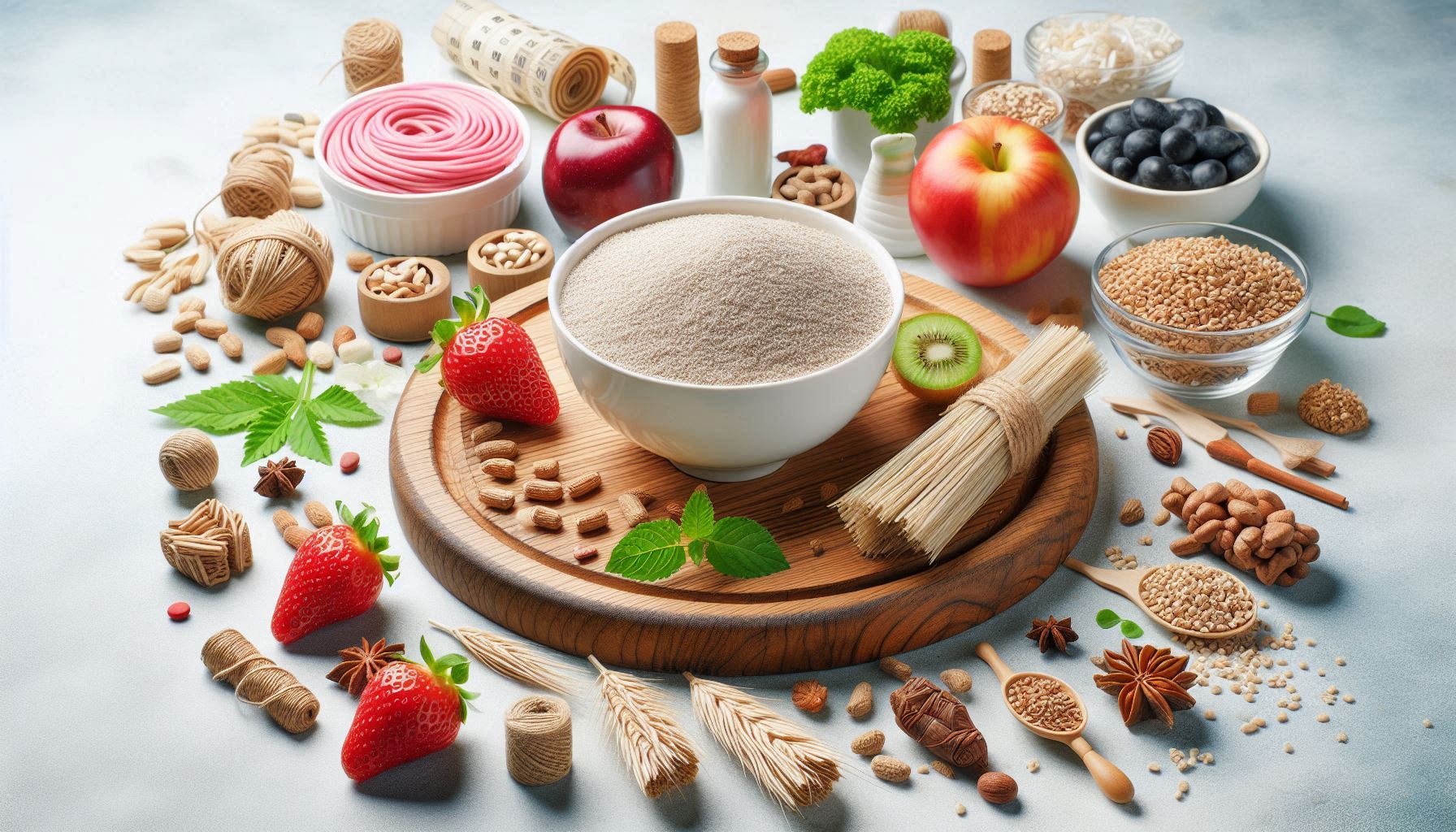Fiber is a vital part of a healthy diet, essential for maintaining digestive health and supporting weight management. Despite being one of the most beneficial nutrients, it is often overlooked and under consumed in many diets, especially in the fast-paced world of modern nutrition trends. Although fiber cannot be digested by the human body, it offers a wide range of health benefits that contribute to overall well-being.
Fiber plays a key role in enhancing gut health by promoting regular bowel movements and preventing constipation. It also supports a healthy gut microbiome, which is crucial for digestion, immune function, and disease prevention. By providing nourishment for beneficial bacteria, fiber helps maintain a balanced gut flora, which in turn supports digestion and reduces inflammation.
In terms of weight management, fiber helps control hunger and promotes feelings of fullness. It slows down digestion, which can help reduce overeating and unnecessary snacking. Fiber also helps stabilize blood sugar levels, preventing spikes that often lead to cravings. Additionally, it promotes a feeling of satiety, making it easier to manage calorie intake and maintain a healthy weight.
To reap the benefits of fiber, it’s important to include a variety of fiber-rich foods in your diet. These include fruits, vegetables, whole grains, legumes, and nuts. Drinking plenty of water also helps support fiber’s role in digestion and ensures that it moves smoothly through the digestive tract.
Incorporating fiber into your daily meals can improve digestive function, regulate blood sugar, and assist in weight management. With its numerous health benefits, fiber is a cornerstone of a balanced and nutritious diet.
Understanding Fiber: What Is It and Why Is It Important?
Fiber is a type of carbohydrate found in plant-based foods. Unlike sugars and starches, fiber cannot be digested or absorbed by the body. Instead, it travels through the gastrointestinal tract relatively intact, performing a variety of functions that benefit both the digestive system and overall health. Fiber plays a critical role in maintaining healthy digestion, regulating blood sugar levels, reducing cholesterol, and assisting in the regulation of body weight.
Fiber is classified into two main categories, each with unique health benefits:
- Soluble Fiber: Soluble fiber dissolves in water and forms a gel-like substance in the stomach. This type of fiber is known for its ability to lower blood cholesterol levels and stabilize blood sugar. Common sources of soluble fiber include oats, barley, beans, lentils, apples, and carrots.
- Insoluble Fiber: Insoluble fiber does not dissolve in water. Instead, it helps to add bulk to stool and accelerates the passage of food through the digestive system. This type of fiber is critical for promoting regular bowel movements and preventing constipation. Foods high in insoluble fiber include whole grains, wheat bran, nuts, seeds, and the skins of many fruits and vegetables.
Together, these two forms of fiber work synergistically to support digestive health, regulate metabolic processes, and contribute to long-term well-being.
The Role of Fiber in Digestive Health
The digestive system plays an essential role in breaking down food, absorbing nutrients, and eliminating waste. Fiber is crucial in maintaining the efficiency of this system by improving digestion, preventing common digestive disorders, and promoting a healthy microbiome.
Promoting Regular Bowel Movements
One of the most well-known benefits of fiber is its ability to improve bowel regularity. Insoluble fiber, in particular, increases the volume and weight of stool. It absorbs water as it moves through the intestines, softening the stool and making it easier to pass. This is especially helpful for people who suffer from constipation.
Regular bowel movements are vital for removing waste and toxins from the body. By keeping the digestive system running efficiently, fiber helps to prevent constipation, bloating, and abdominal discomfort. For those prone to irregular bowel habits or constipation, increasing fiber intake can have a significant positive impact.
Preventing Diverticulosis
Diverticulosis is a condition where small pouches (diverticula) form in the walls of the colon. These pouches can become inflamed or infected, leading to diverticulitis, a more serious condition. This is often caused by chronic constipation, which leads to excessive straining during bowel movements.
Fiber, particularly insoluble fiber, helps prevent diverticulosis by ensuring that stools remain soft and easy to pass. By improving regularity and preventing constipation, fiber reduces the strain on the colon and minimizes the risk of diverticular formation.
Supporting a Healthy Gut Microbiota
Our gut is home to trillions of microorganisms, collectively referred to as the gut microbiome. These microbes play an essential role in digestion, immune function, and overall health. Fiber acts as a prebiotic, providing food for beneficial bacteria in the gut.
When fiber is fermented by the gut bacteria, it produces short-chain fatty acids (SCFAs), such as acetate, propionate, and butyrate. SCFAs have numerous health benefits, including providing energy to colon cells, maintaining the integrity of the intestinal lining, and reducing inflammation in the gut. Additionally, SCFAs have been linked to a reduced risk of several chronic diseases, including inflammatory bowel disease (IBD) and colorectal cancer.
By promoting the growth of beneficial bacteria and supporting the production of SCFAs, fiber plays an essential role in maintaining gut health and supporting the body’s immune function.
Reducing the Risk of Irritable Bowel Syndrome (IBS)
Irritable bowel syndrome (IBS) is a common gastrointestinal disorder characterized by symptoms such as abdominal pain, bloating, diarrhea, and constipation. While the exact cause of IBS is unknown, it is often triggered by poor dietary habits, stress, and a disrupted gut microbiome.
Incorporating fiber into the diet can be beneficial for managing IBS symptoms. However, the type of fiber consumed is crucial. Soluble fiber, found in foods like oats, beans, and psyllium, can help regulate bowel movements and improve symptoms of diarrhea or constipation. On the other hand, insoluble fiber may exacerbate symptoms like bloating and discomfort in some individuals with IBS, so it is important to monitor intake and choose fiber sources wisely.
Reducing the Risk of Colon Cancer
Several studies have suggested that fiber-rich diets, especially those high in whole grains, fruits, and vegetables, are associated with a reduced risk of colorectal cancer. This protective effect may be due to fiber’s ability to promote regular bowel movements and decrease the time that potentially harmful substances remain in contact with the colon lining.
Additionally, as fiber is fermented by gut bacteria, it produces SCFAs that have been shown to reduce inflammation and may lower the risk of colon cancer. By maintaining gut health and promoting regular elimination of waste, fiber helps to reduce the exposure of the colon to carcinogens and other harmful substances.
The Role of Fiber in Weight Management
Fiber is a powerful ally in weight management, offering a natural and sustainable way to control hunger, regulate calorie intake, and maintain a healthy weight. Unlike processed foods that may be calorie-dense and nutritionally poor, fiber-rich foods are low in calories but high in volume, making them ideal for those looking to manage their weight.
Increased Satiety and Reduced Hunger
One of the most important ways fiber aids in weight management is through its ability to increase feelings of fullness and reduce hunger. Fiber-rich foods tend to be more bulky and take longer to chew, which can promote a sense of satisfaction after meals.
Soluble fiber, in particular, has the ability to absorb water and form a gel-like substance in the stomach, which slows down the digestion process and helps keep you feeling fuller for longer. This delayed gastric emptying leads to an extended period of satiety, making it less likely that you will reach for unhealthy snacks or overeat during meals.
By increasing satiety, fiber helps reduce overall food intake, which is critical for effective weight management.
Slowing Down Digestion and Absorption
In addition to promoting satiety, fiber slows the digestion and absorption of nutrients. This is particularly important for regulating blood sugar levels. When fiber is present in the digestive tract, it slows the absorption of glucose into the bloodstream, preventing sharp spikes in blood sugar that often lead to cravings and overeating.
The slow and steady absorption of nutrients also helps to maintain consistent energy levels throughout the day, reducing the likelihood of energy crashes that might lead to unhealthy food choices. By stabilizing blood sugar and insulin levels, fiber can help prevent the overconsumption of high-calorie foods that contribute to weight gain.
Reducing Caloric Intake
Fiber-rich foods, such as fruits, vegetables, whole grains, and legumes, are generally low in calories but high in volume. These foods provide bulk without contributing significant calories to the diet, allowing individuals to eat larger portions while still maintaining a calorie deficit.
Incorporating more fiber into the diet can help individuals feel fuller on fewer calories. For example, a salad made with leafy greens, beans, and vegetables may be low in calories but filling, compared to a smaller portion of processed food that is calorie-dense and less satiating. This reduction in calorie density makes fiber a valuable tool in weight loss and maintenance strategies.
Supporting Fat Burning and Reducing Fat Storage
Recent research suggests that fiber may play a role in reducing fat storage, particularly in the abdominal area. Certain types of fiber, especially those from whole grains and vegetables, may influence hormones involved in fat storage and energy regulation. These hormones, such as insulin, ghrelin, and leptin, are critical in the body’s response to hunger and fat accumulation.
Fiber may improve insulin sensitivity, which helps the body use glucose more effectively and prevents the storage of excess fat. Furthermore, fiber-rich diets are associated with lower levels of visceral fat, which is the fat stored around internal organs and is closely linked to various metabolic diseases.
Enhancing Gut Hormone Production
Fiber has been shown to influence the production of several gut hormones that regulate appetite and metabolism. One of the most notable is ghrelin, the hormone responsible for stimulating hunger. Fiber reduces the secretion of ghrelin, helping to reduce feelings of hunger and cravings.
In addition, fiber increases the release of peptide YY (PYY), a hormone that induces feelings of fullness. By influencing these hormones, fiber helps to regulate appetite, control food intake, and prevent overeating, all of which are essential for maintaining a healthy weight.
How Much Fiber Should You Be Eating?
The recommended daily intake of fiber varies depending on age, sex, and life stage. However, most adults fall short of the recommended fiber intake. The general guidelines are as follows:
- Men (under 50 years old): 38 grams per day
- Women (under 50 years old): 25 grams per day
- Men (over 50 years old): 30 grams per day
- Women (over 50 years old): 21 grams per day
Despite these recommendations, studies show that most individuals consume far less fiber than they need. Increasing fiber intake gradually, along with drinking plenty of water, is crucial to avoid digestive discomfort such as bloating, gas, or cramps.
How to Increase Fiber in Your Diet
To reap the benefits of fiber, it is essential to incorporate a variety of fiber-rich foods into your diet. The following are excellent sources of dietary fiber:
- Fruits: Apples, pears, berries, bananas, oranges, and avocados
- Vegetables: Carrots, broccoli, spinach, kale, sweet potatoes, and peas
- Whole Grains: Oats, quinoa, brown rice, barley, and whole wheat products
- Legumes: Lentils, chickpeas, black beans, and kidney beans
- Nuts and Seeds: Almonds, chia seeds, flaxseeds, and walnuts
By diversifying your fiber sources, you can ensure that you are getting both soluble and insoluble fiber, maximizing the health benefits that fiber has to offer.
Conclusion
Fiber is a crucial nutrient that plays an integral role in maintaining both digestive health and weight management. Its benefits extend beyond digestion, as fiber helps regulate blood sugar levels, supports a healthy gut microbiome, and aids in fat metabolism. By promoting regular bowel movements, enhancing satiety, and reducing the risk of chronic diseases, fiber serves as a powerful tool for long-term health.
Fiber supports digestive health by improving bowel regularity and preventing constipation. Insoluble fiber adds bulk to stool, making it easier to pass, while soluble fiber helps regulate cholesterol levels and stabilize blood sugar. Additionally, fiber promotes a healthy gut microbiome by providing nourishment for beneficial bacteria, which in turn produces short-chain fatty acids that help maintain gut health and reduce inflammation.
In terms of weight management, fiber is especially effective in promoting fullness and reducing hunger. Foods rich in fiber take longer to digest and absorb, helping you feel fuller for longer periods. This natural satiety helps curb overeating and unnecessary snacking, making it easier to manage caloric intake. Furthermore, fiber slows the absorption of sugars, preventing sharp blood sugar spikes that often lead to cravings and overeating.
To maximize the health benefits of fiber, it’s essential to incorporate a variety of fiber-rich foods into your daily diet. These include fruits, vegetables, whole grains, and legumes. It’s also important to drink plenty of water to support fiber’s digestive benefits and prevent discomfort such as bloating.
Incorporating more fiber into your meals can help you feel satisfied, improve digestion, and support your weight management goals. With its many health benefits, fiber is a cornerstone of a balanced, nutritious diet.
SOURCES
Slavin, J. L. (2013). Dietary fiber and body weight. Nutrition, 29(4), 711-718.
Anderson, J. W., & Baird, P. J. (2009). Health benefits of dietary fiber. Nutrition Reviews, 67(4), 188-194.
Esfahani, A., & Mirmiran, P. (2014). The role of fiber in weight management. Current Diabetes Reviews, 10(4), 253-257.
Slavin, J. L. (2018). Dietary fiber and the gastrointestinal tract. The Journal of Nutrition, 148(3), 1280-1287.
Tiwari, U., & Cummins, E. (2013). Nutritional benefits of dietary fiber in foods. Food Research International, 51(2), 26-36.
López-Contreras, J. M., & Ríos-Leyva, A. A. (2019). Effects of fiber intake on the gut microbiota, obesity, and cardiovascular diseases. Journal of Clinical Medicine, 8(4), 420.
Brouns, F., & Kettlitz, B. (2002). Dietary fiber and the regulation of body weight: The role of functional food ingredients. European Journal of Clinical Nutrition, 56(12), 1089-1096.
Shin, S. S., & Kim, H. S. (2015). Dietary fiber and its effects on health. Journal of Nutritional Science & Vitaminology, 61(3), 223-228.
Slavin, J. L. (2005). Dietary fiber and obesity. Nutrition, 21(3), 411-418.
Threapleton, D. E., & Greenwood, D. C. (2013). Dietary fiber and weight regulation: Systematic review and meta-analysis. American Journal of Clinical Nutrition, 97(6), 1052-1062.
HISTORY
Current Version
November 28, 2024
Written By:
SUMMIYAH MAHMOOD




